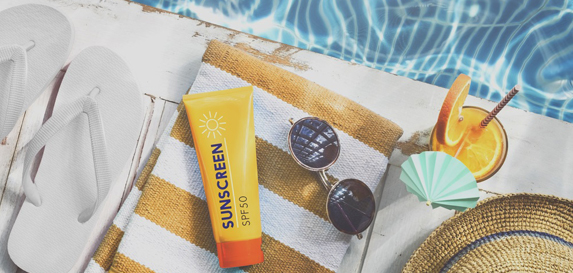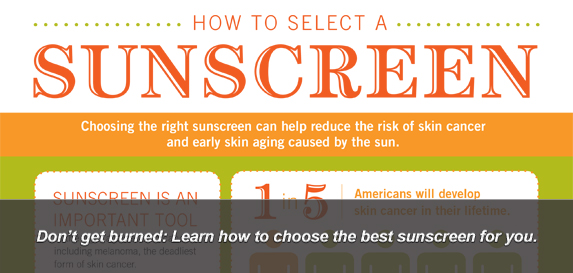
Tips to help cancer survivors stay safe, while having fun, during the summer months.
The warm, sunny days of summer beckon us to go outside and enjoy the beauty of nature in full bloom. It’s a time for renewal and relaxation, which is exactly what cancer survivors need.
As much as the summer season ushers in fun, it also means you have to take a few extra precautions. Whatever your plans this summer, knowing how to prepare can help keep you safe—while having some fun.
1) Preparing for Your Summer BBQ
Barbecueing is a summer staple that gives friends and family a reason to get together and enjoy the outdoors.
One thing to keep in mind is food safety, as the summer heat can increase the amount of bacteria found in food. These bacteria are the primary cause of foodborne illnesses, and for people with a compromised immune system, a simple case of food poisoning can have serious consequences. Avoiding foodborne illnesses is possible when you take a few precautions before, during and after you cook.
- Always use hand sanitizer before eating finger foods.
- Be diligent about washing your hands and disinfecting surfaces after they come in contact with any raw meat.
- Keep cold foods in a cooler instead of sitting out on a table.
- Never leave perishable foods out for more than two hours. Reduce it to just one hour if you’re outdoors and the temperature is 90 degrees or higher.
- Use a thermometer to help ensure meat is fully cooked to the minimum internal temperature.
- Precook food before it goes on the grill to limit time on the grates. This will minimize your exposure to carcinogens.
- Keep meats separated from other foods to prevent cross-contamination.
- Don’t wash chicken. It can spread contaminants and isn’t necessary.
- Use paper plates that can be thrown out, so you don’t accidentally put cooked food on a plate that held raw meat.
- Put meats at the bottom of the cooler, so juices don’t drip on other food.
- For more tips on staying safe and having fun during a summer BBQ, check out our article on outdoor grilling for the 4th of July.
- If you have questions about food safety, call the U. S. Department of Agriculture (USDA) hotline at 1-888-674-6854, or visit the Ask Karen section of the USDA website.
2) Spending a Day at the Beach
The beach and summertime often go hand-in-hand. If you aren’t lucky enough to live on the coast, you may have a trip planned to get there. While the beach can provide much needed relaxation, there are a few things to be aware of.
Sun Exposure
Certain therapies, including radiation and chemotherapy, can make your skin more sensitive to UV rays. We all need to protect ourselves to prevent skin cancers from forming, but survivors have to be even more careful about excess sun exposure.
It’s best to avoid going to the beach between 11 a.m. and 4 p.m.—when UV rays are at their peak. No matter what time of day you go beachcombing, make sure to apply an ample amount of sunscreen with a broad spectrum SPF of 30 or higher. Sunscreen will need to be reapplied every two hours to prevent unintentional UV exposure.
Sand
There are few things to keep in mind when you pick a spot on the sand. The sand will actually reflect 15 percent of UV rays, which can intensify your sun exposure. Whenever possible, try to find a shady spot, or create your own with an umbrella. Also, avoid areas with seaweed and debris that may have harmful bacteria.
Swimming
When it’s hot, a swim is the perfect way to cool off. However, if you’re currently undergoing treatment or have recently had surgery, you may need to skip the swim.
Like the sand, the water can also reflect UV rays. Survivors with extra sensitive skin can also be affected by the salt and bacteria in the water. If you have fresh wounds, a catheter, a port or are currently on chemo or radiation therapy, it’s best to forgo a dip in the ocean. When you do swim, keep your head above water, since ingestion can expose you to waterborne pathogens.
3) Lounging by the Pool
The pool is another hot spot during the summer months. Kids and adults both enjoy splashing around to cool off, but anyone undergoing cancer treatments may want to reconsider.
In addition to the beach tips above, you’ll also need to be careful around chlorine if you’re undergoing chemotherapy and/or radiation. The chemicals in a chlorine pool can harm sensitive skin. If your skin is already irritated from radiation, the chlorine will further irritate your skin. The heat of a hot tub also poses a risk, because it’s a breeding ground for bacteria.
Lounging in the shade with a cool drink and fresh fruit is a great way to spend time by the pool with your friends and family.
4) Enjoying Summer Produce
Fruit and veggie lovers can’t wait for summer, because it’s packed with fresh produce. Everything from berries to leafy greens are in abundance and ready to eat. It’s exactly what a healthy diet should include, but cancer survivors will need to take a few precautions during and just after treatment.
- Always wash fruits and vegetables, even if they’re organic.
- Wash produce with water only. You can also use a clean produce scrubber on fruits and vegetables that have thick skins.
- Cook vegetables whenever possible to kill bacteria.
- Peel all fruits and veggies before eating (after they’ve been washed).
You may also want to consider these summer produce options:
- Snack on dried fruits for extra fiber.
- Eat more avocados—they're a source of healthy fat and less likely to absorb pesticides thanks to their thick skin.
- Fill your plate with watermelon and tomatoes. Both fruits contain lycopene, an antioxidant that protects skin from UV rays.
Avid Gardeners
Going through treatment doesn’t mean you have to let your garden get overgrown. You just have to take care to protect yourself with gardening gloves and a mask if you know fungal spores may be floating in the air. It’s also a good idea to look for all-natural and organic fertilizer options in lieu of products with chemicals.
5) Beating the Heat
One thing that can spoil summer fun is the heat. Many areas of the country regularly experience temperatures over 90 degrees from July to September. High temperatures can pose a health risk for anyone, but cancer survivors have to be extra careful to avoid dehydration and increased fatigue.
- Drink plenty of water. Recent reports have found 75 percent of people in the U. S. don’t drink enough water daily. During the hot summer months, when we sweat more, the need for water increases. Aim to drink at least eight to 10 cups of water a day.
- Avoid caffeine and alcohol. Caffeine and alcohol may already be too harsh on the body, especially during the hot summer months. Both types of beverages can cause dehydration or even trigger hot flashes.
- Wear lightweight wigs. If you plan to wear wigs or hairpieces during the summer, consider making the switch to a lightweight option. Wigs with a short hairstyle, as well as pieces made of synthetic material, can help reduce warmth.
- Stay indoors during the hottest hours of the day. Between 11 a.m. and 4 p.m., the temperature soars. It’s best to limit your time outdoors during this period, and relax indoors instead.
- Find a shady spot. When you’re outdoors, shade can help make the heat much more bearable. Shade doesn’t actually lower the temperature, but it does make the air feel 10 to 15 degrees cooler. Don't forget your sunscreen!
If you have a summer vacation or activity planned, ask your doctor for additional safety tips. You doctor and care team can provide specific advice, based on your current condition and where you live or where you’re going.

